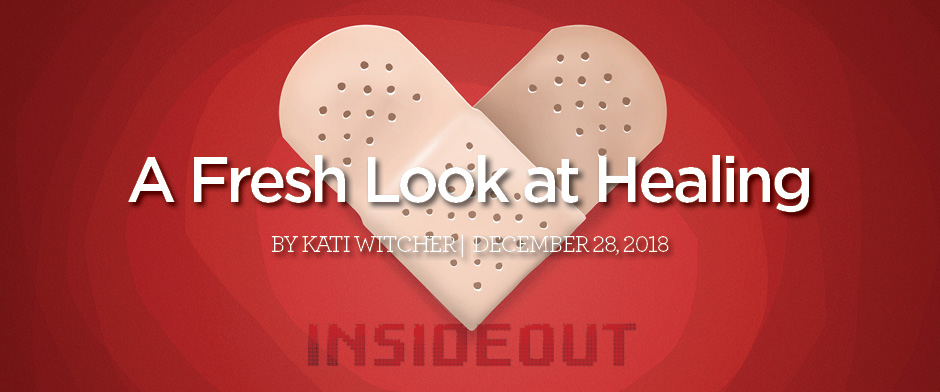A Fresh Look at Healing
“If your only definition of healing is a cure, then you may be missing out on the daily miracles God has for you.” –Tim Reside, M.A. in Practical Theology and President of Bright Tomorrows
Growing up as a PK (pastor’s kid), I’ve heard seemingly every interpretation of healing. I have often been conflicted between claiming Scripture for healing and the divine will of God. Before my own eyes I’ve seen many people physically healed, but I’ve also heard of missionaries—people full of faith—dying from sickness. According to the Bible, I know God wants us to live an abundant life (John 10:10), but I also know the writings of Paul in which he delights in his own weaknesses and calamities (II Corinthians 12:10). Considering the relationship of these concepts, when I heard Tim Reside’s view on the subject during a Christian support group called Brighter Tomorrows, I was inspired to study the conditions of healing in the Scripture for myself.
Two of the most recited scriptures on healing are Isaiah 53:5 and I Peter 2:24. I dare you to study them. However, given the context of these passages, the word heal is related to something spiritual, not exclusively physical. In the original languages of the Bible, heal has multiple meanings, although our translated version only has one. Throughout the books of the Bible, healing has many applications; it can be physical, emotional, spiritual, relational, and earthly (for the planet). No matter what scripture we read, the root meaning and intentional purpose of healing is “to make whole”. That’s what Jesus does. But what if He doesn’t always answer our prayers for healing?
The apostle Paul likely needed every kind of healing. In II Corinthians 12, he asked God three times to remove the thorn in his side, but God would not. His unresolved pain inspired him to write the cherished verse; “Therefore I take pleasure in infirmities, in reproaches, in necessities, in persecutions, in distresses for Christ’s sake: for when I am weak, then am I strong” (II Corinthians 12:10). There are three major lessons to learn.
First, Paul did not assume healing. It has never been a continual promise to us in Scripture.
Secondly, Paul was persistent in requesting healing. We too should still make our requests known to God (Philippians 4:6).
Finally, there is purpose in pain. It simultaneously humbled Paul and displayed God’s strength. No doubt Paul was a man of faith, yet he still lived with much pain. Presently, it is not uncommon for Christians to explain persistent sickness as a lack of faith despite many scriptural references pointing to the divine will of God as a more suitable explanation. The life of Paul changed the world and influenced our very own salvation two thousand years later, and despite his issues, he was greatly used for the larger purpose of God’s kingdom.
Another popular memory verse reads, “And if we know that He hear us, whatsoever we ask, we know that we have the petitions that we desired of him” (I John 5:15). But the verse before this one reads, “And this is the confidence that we have in him, that, if we ask anything according to his will, he heareth us” (I John 5:14). In this verse, it is clear that we must pray according to His will, not our own. Although we may not know what that may be, trusting in His higher ways is crucial while He is making us whole. According to this passage and those similar, there are often conditions to God meeting our needs. My pastor frequently reminds the congregation, “God is not an ATM!” But He is the all-knowing God who sees the bigger picture beyond our limited human view. If everyone is not healed, it surely does not mean God is not faithful, but perhaps it is an issue of our own motives or perspectives. His plan for our lives is intensely intricate and divinely perfect, and we will not fully understand how each detail works together for our good (Romans 8:28) until we meet Him.
Among the increasing “name it and claim it” prosperity gospel trend of Christianity, it can be confusing when someone is not healed. However, we must cling to the unchanging truth found in God’s Word. “Trust in the LORD with all thine heart; and lean not unto thine own understanding” (Proverbs 3:5-6). Our definition of healing may not always match God’s definition. Of course we never want to see others suffer in pain and sickness, but if we do not see healing now, we have the promise of Heaven, a place where “there shall be no more death, neither sorrow, nor crying, neither shall there be any more pain” (Revelation 21:4).
Let us be encouraged to trust God and continue asking with faith according to His will for healing. Whether we see it now or in Heaven, we are sure that God is making us whole.
I am a recent college graduate, PK, aspiring licensed minister and therapist, barista, musician, and worship leader at North Point UPC in Sperry, Oklahoma. As an ENFJ, I love doing what I can to support the personal growth of all individuals. I am passionate about educating and discussing subjects that may not always be mentioned in a traditional sermon because I firmly believe knowledge is power (especially as witnesses of Jesus Christ). I love God, I love people, and I live like it is contagious.








